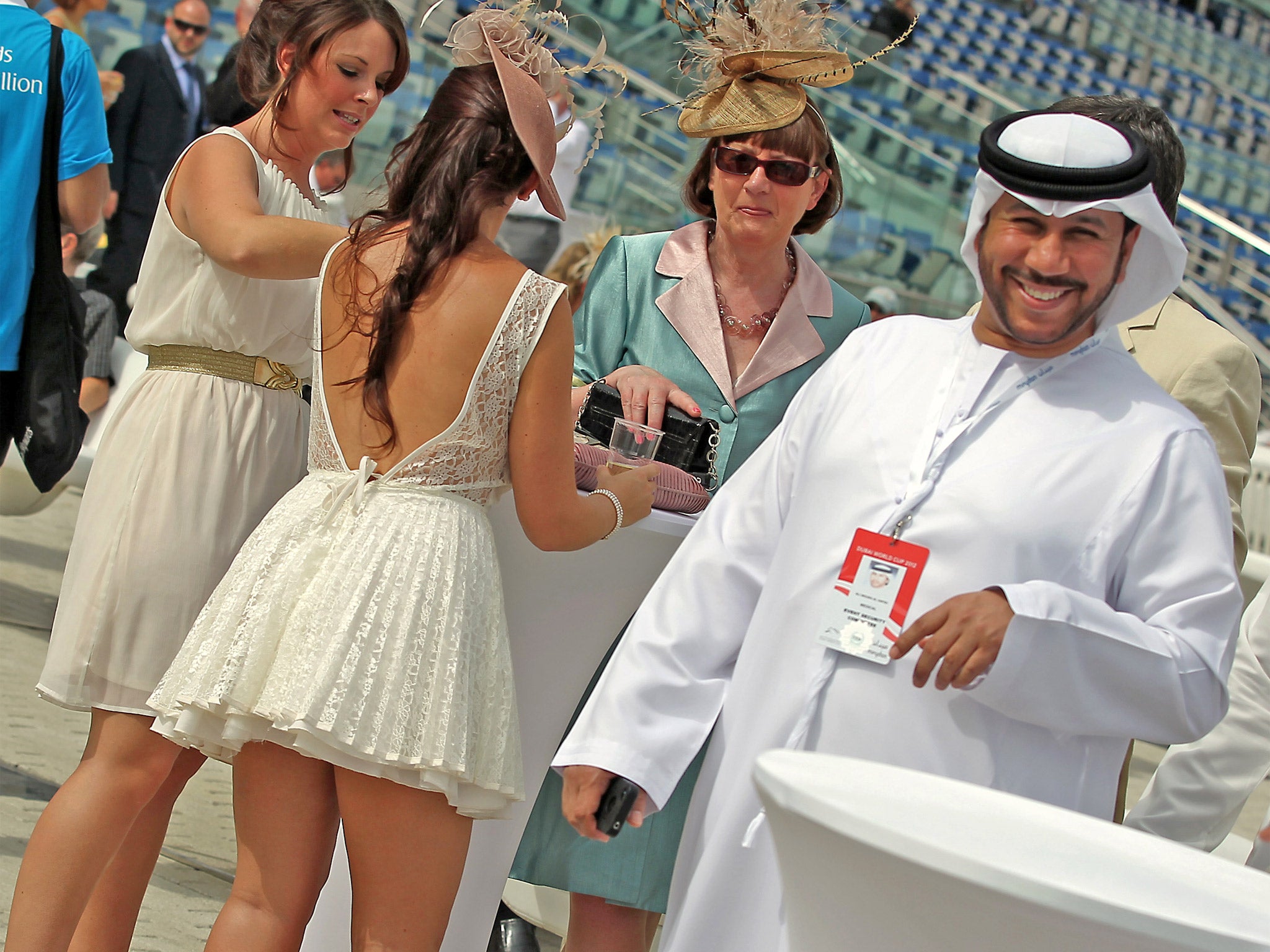Kevin Garside: Sport in the desert – it's one of the great illusions of the age
The Way I See It: More watch Bognor Regis in the Ryman League than the UAE in Abu Dhabi

A selection of the world's greatest golfers were not the only thrill-seekers in Dubai last week. Rafa Benitez negotiated his appointment as Chelsea manager while holidaying in the Emirate. By coincidence Chelsea captain John Terry was lounging by a pool on the fabled Palm when the news broke of Roberto Di Matteo's demise. Maybe Rafa and JT hatched the plan together over dinner at Atlantis.
"John, why don't you give Roman a bell and tell him I'll keep the place tidy for six months until Pep is ready to take over?"
"Leave it to me. Boss."
Benitez was quickly into his stride, signing the shirt of a Chelsea fan in a bar by the World Trade Centre before departing for his press conference at the Bridge.
That the machinations of a club dominating English football's news cycle should play out in Dubai is weird, yet fitting. This place was at the centre of the golfing world last week, hosting Rory McIlroy, Luke Donald, Sergio Garcia, Lee Westwood et al, yet nowhere near the heart of the sport.
There is an essential absurdity about playing and watching golf, or any other sport for that matter, in the desert. The 18-hole ribbon of green that threads through a land where little grows of its own accord is a triumph of engineering over common sense, a towering testament to the power of man's ingenuity over nature. The view from the Earth Course back towards the shores of the Persian Gulf offers further proof of what is possible, for there, clustered in all its gauche glory, shimmers Dubai's tribute to the Manhattan skyline.
For citizens of Chelsea and expat professionals banking their tax-free wedge, with an apartment on the Corniche and a membership at the Jumeirah Estates golf complex, time spent in the United Arab Emirates must make some kind of sense. But for this episodic visitor, steeped in the mores of an established sporting culture, there is a huge hole at the centre of the enterprise.
Personal misgivings are not related to the swathes of unfinished building projects that litter the landscape or the proclivities of those who choose to live the Dubai life. For an event to have meaning and relevance it requires people to care about the outcome.
World No 1 McIlroy walked out on Thursday for his opening round almost hand in hand with his partner Caroline Wozniacki. The pair engaged in audible conversation as he followed his ball down the 10th fairway. They might have been walking the dog in Monaco. The attending marshals were superfluous since hardly anybody was watching. Never has £1.6m, the potential prize fund available to the winner of the tournament, and the bonus pool jackpot that accompanied it, been contested before so few.
Eleven days ago, the UAE national football team played Estonia in Abu Dhabi. Fewer than 300 turned up. They get more than that at Bognor Regis in the Ryman League. Dubai boasts the largest grandstand of any horseracing venue in the world at the Meydan Racecourse. It is a mile long with a capacity of 60,000. Last Thursday evening, a media delegation from the DP World Tour Championship, amounting to 20-odd blokes on a bus, must have doubled the attendance. From the Sheikh Zayed Road, the main artery running through the centre of Dubai, the vast sweep of metal and glass on the horizon has no greater function than a massive lightbulb illuminating a vast stretch of nothingness.
The importing of sporting events without a culture to underpin them is not unique to the UAE. The development was pioneered by Formula One with races in Malaysia, China, Turkey, Bahrain, Singapore and India as well as Abu Dhabi playing out in front of negligible crowds, save for the expats who roll up on Sundays.
The value for this state-backed indulgence is geo-political, the return on investment measured in the increased awareness generated by sports that play out to huge global television audiences. It does not matter that the galleries are sparsely populated. The Olympic Games in China was one of the great illusions of the modern age, projecting a sense of occasion via television that was largely absent in the Olympic village and wider Beijing. The World Cup in Qatar will follow Beijing into that slot when it hosts the World Cup in 2022. The greatest show on earth will play out across 12 stadia in one city, Doha. It will be the first World Cup without taxi receipts since all the arenas are connected by the metro system. The whole event will be negotiated by tube. The next tranche of spending is to be unleashed in the middle part of next year when infrastructure work continues at the five venues yet to be built.
Fear not: the great metropolis that dominates the Doha skyline today was a model sitting on a planner's desk in 2003. The city went up in the space of five years, built on the back of vast reserves of liquid petroleum gas. The World Cup, irrelevant to the people of Qatar, will work, just as the golf did last week, made for TV in defiance of the local culture and landscape.
Join our commenting forum
Join thought-provoking conversations, follow other Independent readers and see their replies
Comments
Bookmark popover
Removed from bookmarks